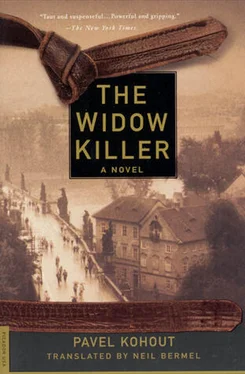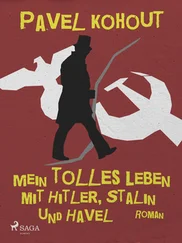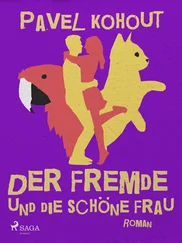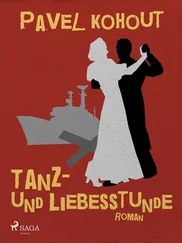His superior looked meaningfully into his eyes. Morava had to clear his throat again nervously.
“You’re aware that it’s not just our prestige at stake here,” Beran continued. “I tried to explain that to you the other day.” Yes___
“If your head is starting to spin again, we can go for another walk.”
“Yes….”
“Besides, I heard your cooperation with our colleague was going well.”
“Yes, he doesn’t seem to have any reservations about our work.”
“If the Germans see the second murder the same way we do, they might drop the theory that this is the work of the Czech Resistance.”
“But then there’d be no reason…,” Morava objected, but fell silent when the superintendent put his index finger to his lips.
“I assume,” Beran said, “that out of simple collegiality they won’t recall the chief detective just yet. The killer has shown that he doesn’t play favorites; German women are still in danger, just as Czech ones are. Mr. Buback can still assist you with security measures for potential victims on both sides. What ideas do you have?”
Morava put forth the conclusion he had reached that morning on the tram. In none of the three cases to date — including Brno, if it belonged among them — was there any sign that the perpetrator had used violence to gain entrance to the apartment; on the contrary, all indications were that he had been admitted willingly, although both Prague women had been mistrustful loners. How did he do it? Where did he first speak to them? How did he win their trust?
“This leads me to question our rationale for placing the case under strict censorship. Panic and fear can’t overshadow the positive effect of publicity: women would be warier of unfamiliar men who try to win their favor.”
“There’s still a risk that the killer might gain confidence from the publicity and increase his activity, like an egotistical artist,” Beran countered. “You and Mr. Buback should weigh your options together; both sides need to agree on a single approach.”
“It only makes sense to do so,” Morava continued, spinning his thread further, “if we have the courage to describe his method in detail. This butchery has a ritual element to it that must have a source. Given how repulsive it is, it has to be some sort of dark art.”
Beran frowned. “I’d be afraid of that. At a certain extreme these things exert a repulsive fascination. I’ve met any number of copycats in my day; I’d rather not inspire some other deviant to try and top the one we’ve got now. No, Morava, you’ll think I’m old-fashioned, but I won’t sign off on hocus-pocus like that. Don’t be disappointed; a compromise can always be found.”
“What sort, in the given case?” Morava asked skeptically.
“Send out a brief official announcement about a deviant murderer who preys on gullible women. And at the same time — I’ve got it now— send out detailed factual information to all our offices. They’ll distribute the description confidentially to individuals whose work brings them into contact with large numbers of people; they might uncover some connection between one of them and what you’re calling a ritual. I’m thinking of doctors, teachers, postmen too; you’ll certainly come up with others. If you’re right, there must be something that inspired him. Assuming Mr. Buback agrees, you can start today; my nose tells me we don’t have much time.”
Morava also mentioned his conversation with Buback about Jitka’s father, and was assured that the superintendent would intervene as well at the first opportunity.
“But, Morava, don’t give her any illusions,” Beran finished after checking that Jitka was not in the anteroom. “We are all more mortal than we’ve ever been. Even as we speak, this war is gathering its own momentum, independent of the warlords. Soon laws, institutions, and governments will have no force, and even logic itself — not to speak of morality — will go by the wayside. You can fight an elemental force up to a certain critical point; after that it may be all you can do just to survive it.”
With this, his boss dismissed him.
As Morava was dictating a brief message for confidential distribution to doctors, teachers, postal carriers, and other public-sector workers, Jitka asked, “What about clergymen?”
Like Morava, Buback had kept his report short and sweet. And the chief inspector also concluded that the latest crime made any political motivation for the murders seem doubtful. He agreed that they would nonetheless continue to play up the baroness’s case as a threat to German women in Prague, so that the Gestapo’s continuing interest would seem plausible. Sharing his observations about the Brno police, he mentioned what he had noticed on their trip to southern Moravia. At this even the powerful Meckerle lowered his voice.
“My dear Buback,” he addressed him more confidentially than he’d ever done before, “you are the only detective here with the slightest bit of sense; the rest are worthless shit-for-brains who got in on their connections. That’s why I’ve given you this assignment; it’s more important than you probably realize. My sources tell me the secret weapon — the one that will wrap up the war in a matter of days — will be ready for launch in mid-May. I don’t have to make borscht for you, and I can spare myself Goebbels’s nonsense about luring the Anglo-Americans and the Bolsheviks into the greatest trap in military history. We are retreating because right now the enemy has a severalfold advantage in manpower and materials, and there’s no reason to be ashamed of it. Until the new weapon can turn the tide, we simply have to hold on and to prepare ourselves for every eventuality; do you understand what I’m saying?”
He saw that Buback was confused, so he leaned his trunk forward over the desk to make the point more forcefully.
“The Führer has just issued an order, and personally transmitted it to the highest party functionaries in the army, security forces, and state and public offices. According to him, policies we previously applied only in occupied countries will now come into effect in the territory of the Reich as we retreat. I’m talking about the total annihilation of all transportation, communication, industrial, and distribution networks. Total, Buback. Do you understand what this means?”
He did, and felt himself flush. I’m afraid, he realized, my God, I’m afraid! It was an unfamiliar feeling for him; at critical moments he tended to be coolly inquisitive, never frightened. This, however, was truly horrifying news. He nodded in assent.
“I’ll tell you more, just so someone intelligent will know what to do and how to do it, in case I don’t make it. According to witnesses, Imperial Minister Speer objected. ’my Führer,’ he said, ’if we follow through on your instructions we will destroy any hope of keeping Germany alive.’ To which the Führer responded: If we lose this war, Speer, then the German people are as good as lost; failure means they don’t deserve to exist.’”
A clear question played across Meckerle’s face, but Buback could not bring himself to answer it. Is he trying to provoke me? Buback’s head spun; is he testing me? What does he want? After a moment of silence the giant suddenly grinned.
“I know what’s worrying you. No, I don’t want your opinion; I’m simply giving you mine, at my own risk. I’ve had you thoroughly checked out and there wasn’t any indication that you’re a fanatic or a traitor. Your lack of party activity indicates that you joined to keep your job, one you thought would be honorable in any society. And your behavior leads me to believe that your highest goal is the survival of our people, whether or not they achieve what they aspired to. Anyway, if I had the slightest suspicion that you’d betray my confidence, I’d finish you off, Buback, once and for all.”
Читать дальше












